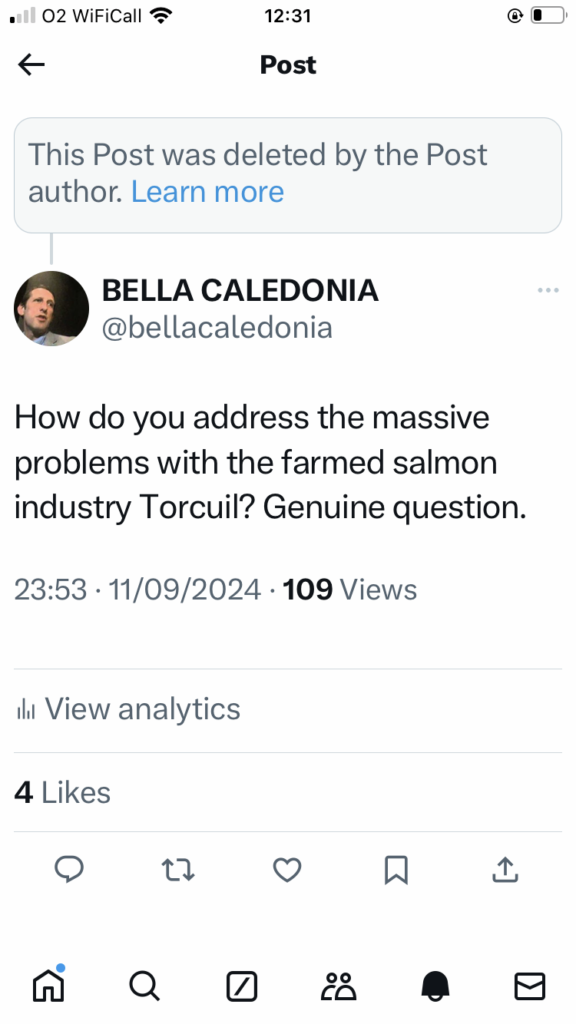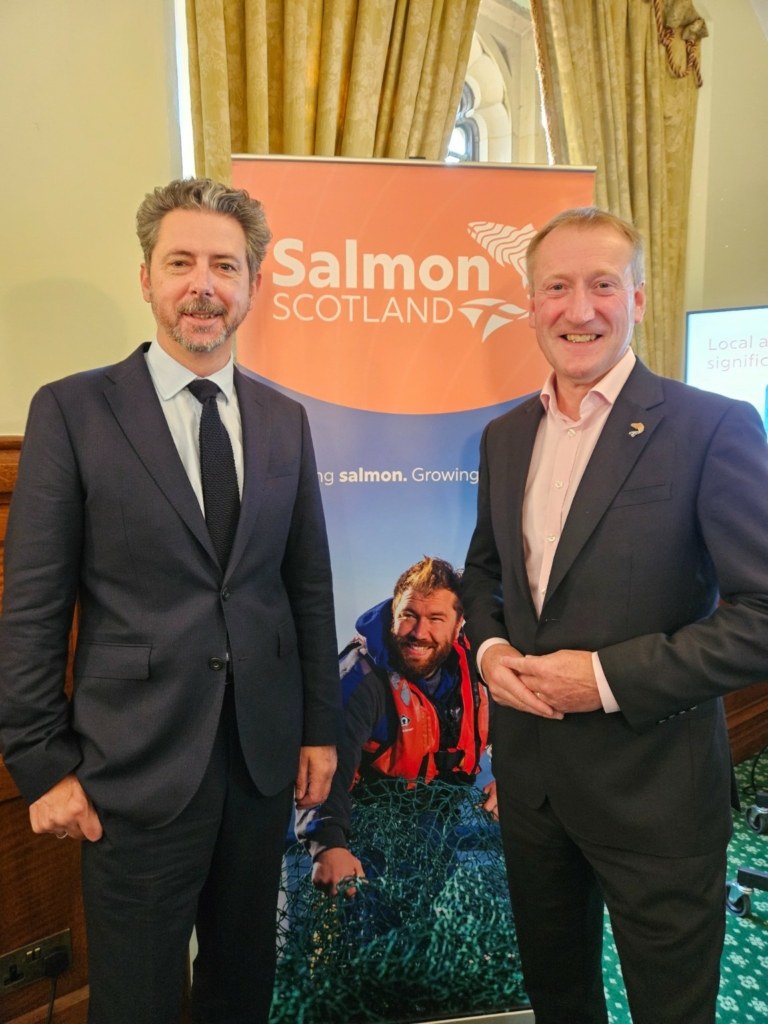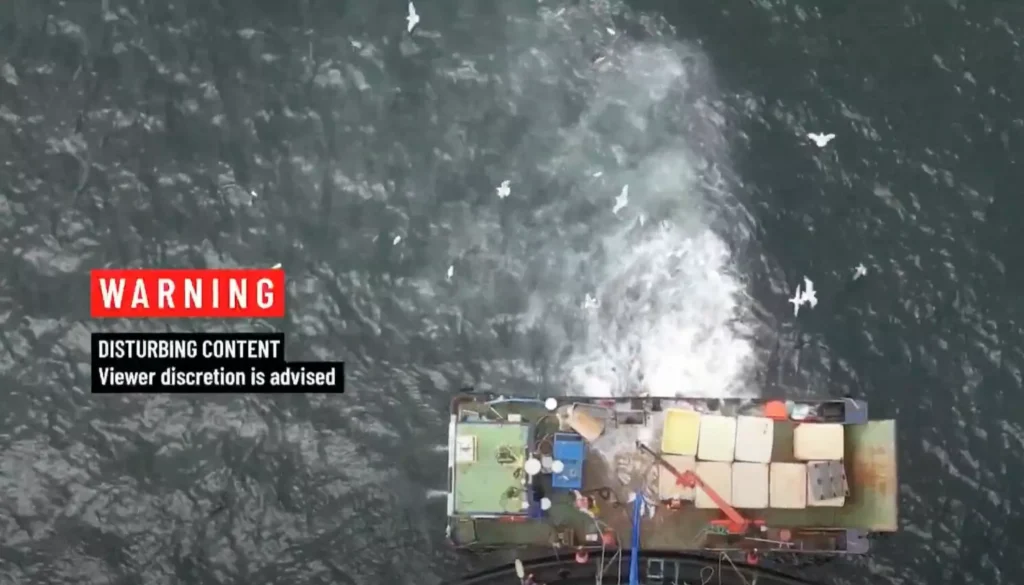Scottish Salmon Greenwashing Propaganda
The former Daily Record reporter and now Member of Parliament for Na h-Eileanan an Iar Torcuil Crichton hosted a ‘breakfast briefing’ for other MPs to “learn more about the economic and environmental benefits of Scottish salmon.” When he was asked about the environmental issues around farmed salmon he deleted his tweet rather than reply. See below.

The event was put on by Scotland Salmon, the industry body, they put out some extraordinary claims, first that “Scottish salmon is the UK’s largest food export, with international sales true increasing by 41 per cent in the first half of 2024, driven by substantial growth in the Asian and American markets and generating £431 million in value over the six months alone” and second that “Salmon is also highly nutritious and has one of the lowest carbon footprints of any protein production.”
Both these things can’t be true. You can’t transport massive amounts of salmon to Asia and America and it have a low carbon footprint. That’s greenwashing propaganda,
The truth is that Scottish salmon is an environmental nightmare.
A vet from the Highlands (Gilleasbuig Aotrom) tweets: “Hello Torcuil. I’m a vet in the Highlands, looking into salmon farming using information in the public domain. Did you know that TEN Scottish salmon farms reported over fifty per cent mortality in 2023? Happy to send you the data.”
Not only is the die-off rate unforgiveable, the actual conditions of the fish is appalling.
Compassion in World Farming conducted an investigation in 2021. Their investigation into the Scottish salmon industry, uncovered the hidden suffering of salmon on an industry-wide and endemic scale, breaches in animal welfare legislation, and shocking mortality rates.
The appalling findings were documented on farms owned by all five of Scotland’s largest salmon producers (Cooke Aquaculture, Grieg Seafood, Mowi, Scottish Sea Farms, and The Scottish Salmon Company), which together account for over 96% of the industry.
CiWF said:
“Salmon are silently suffering, out of sight, in cruel underwater factory farms across Scotland. Even the experienced investigators were shocked at what they found,” said Sophie Peutrill, our Global Campaign Manager for fish welfare. “The footage reveals salmon with deformities and disease, missing eyes, and large chunks of flesh and skin being eaten away by sea lice. This is completely unacceptable.
“Salmon are sentient beings – they should not be subjected to such awful misery. There is an industry-wide failure to protect these animals, and this must change. We need an immediate halt on the continued expansion of Scottish salmon farming.”
None of this is new.
Last year a report from WildFish found salmon farms were certified by leading bodies despite substantial marine pollution, inadequate parasite control and monthly mortality rates as high as 74%. [https://www.salmonscotland.co.uk/reports]
Schemes such as Aquaculture Stewardship Council (ASC) and RSPCA Assured are potentially misleading consumers on the environmental and welfare credentials of certified farmed salmon, the new report found.
The report, Responsibly farmed?, investigated certification bodies ASC, RSPCA Assured and Soil Association Organic, and found numerous examples of how certification of Scottish salmon requires lower environmental and welfare standards than could reasonably be expected by consumers.
These environmental bodies are complicit.
But the issue is not just about animal welfare, nor the huge carbon cost of exporting fish around the world, the issue is also about the contamination of every sea loch in Scotland. This has been known for a very long time but the sort of lobbying and propaganda organised by MPs like Torcuil Crichton and Tavish Scott, chief executive of Salmon Scotland prevents proper regulation or the deindustrialisation of our marine habitats.
Way back in 2012 the Salmon and Trout Association (S&TA) reported on the levels of sea lice treatment chemical residues – which are used by salmon farmers – in the sea-beds of lochs across Scotland. The association was concerned about the impact of juvenile sea lice from the fish farms on emigrating wild salmon and sea trout. We’ve known about all of this for a very long time, but its big business, hugely lucrative for some even if the jobs in Scotland are marginal, low-paid and the environmental impact disastrous for coastal communities across the Western Isles.

The industry propaganda portrays a clean natural seafood, here the rugged fisherman battling the wilderness and clinging to his net behind Crichton and Scott, while the reality is very different. Only this week saw three salmon farms in Scotland suspended from the RSPCA Assured welfare scheme after drone footage emerged that showed sick and moribund fish being left out of the water for too long before being culled.
The footage, released by campaigning charity Animal Equality UK, reveals salmon suffocating in nets, buckets, and on boat decks on farms operated by Mowi, Scottish Sea Farms, and Bakkafrost Scotland. The drone recordings were captured throughout April, July and August 2024 at Loch Alsh (Mowi); Fiunary, Sound of Mull (SSF); and Ardcastle, Loch Fyne (Bakkafrost Scotland).

An RSPCA Assured spokesperson said: “We have launched an immediate investigation into these allegations and suspended membership of the three farms from the RSPCA Assured scheme, pending further investigation. This means they cannot currently market or sell any products under the RSPCA Assured label.”
Salmon – alongside grouse and deer represents everything that is wrong with Scotland. These are the emblems and icons of Scotland, plugged and promoted as the products of our ‘wild’ and natural landscape they are in fact the outcome of landed power. They distort and pollute the land and sea. The Scottish salmon industry is an abomination that needs to be dismantled.
The problem is, as in so many other areas SEPA is not fit for purpose and the lucrative salmon industry can lobby MPs as it is boasting today.

Sea lice attach to Atlantic salmon in small numbers and die off when the fish enter fresh water. However farmed salmon are infested and the industry uses powerful pesticides to attempt control. In many sea lochs only the top few fathoms of water move with the tide so the waste accumulates on the lochs. The licence for farms is issued secretly in Edinburgh to avoid scrutiny. Heads should roll.
There is a similar problem on the west coast of Ireland. Horrendous cruelty, huge pollution.
The difficulty is that saimon farming is one of the few business opportunities available to remote coastal communities where only modesr investment is available.
Any crackdown on salmon farming needs to be accompanied by alternative ways for people without an ology to make a living in these remorte coasts. In Scotland, that will have to involve some radical land reform.
indeed it does, but not the current Land Reform Bill. what is required before anything else is to tax all land and property per square metre according to land types. A separate land type could be fish farms which though not necessarily owned by the owner of the sea or loch bed has a heritable interest in them. A rate could be set for fish farms commensurate with independent analysis of the environmental damage being done.
By taxing land the owners will quickly work out whether they make an economic return on it to pay the tax. If they don’t they’ll quickly offload it. That then opens opportunities for local residents and government to better steward the land both above and below the water.
Land tax is a good idea, but it is more complex than some of its proponents acknowledge.
And land tax alone is not enough to force the sort of radical redistribution of land that Scotland needs
Agreed, not enough. We need radical land reform and when that happens the lochs and the rivers won’t be exploited, the fields and the glens given over to grouse and deer to be shot for fun and profit
Agreed we need alternative jobs but as in most exploitative and extractive industries the money isn’t kept in the local economy the profits are made higher up the chain. There is also the issue of the long-term impact on the marine ecology and the impact that will have on these communities. Examples of alternatives are such as Lamlash off Arran which is a no catch zone and benefits from eco tourism as they’re not trashing their seas.
Sure, most the value of fish farming goes elsewhere. Sadly, the same applies to many other livelihoods in remote communities, which is why this sort of business is still an attractive option for people in those areas.
There is a strong sense in mzny such places of government as a force which does things to them rather than for them, and that sense is content well-founded. Here in Ireland that top-down approach by the (mostly urban) Green Party in govt has given a bad name in rural areas to anything environmentally minded, even if doesn’t hurt livelihoods
George Monbiot has called RSPCA Assured an endorser of animal abuse (essentially a racket).
https://www.theguardian.com/commentisfree/article/2024/jun/18/rspca-britain-oldest-animal-welfare-charity-cruelty-abuse
Even the RSPCA’s own President, Chris Packham, seems to have called for a boycott of his own organisation’s scheme. I read that the first Scottish company to be so accredited, Loch Duart, has pulled out of the scheme in protest that its industrial rivals have been so accredited (needs checking). Their website currently says “Loch Duart is the only salmon farm in the world to become Ikejime Quality Certified.” I don’t know if that Japanese certification has anything to do with fish welfare, or how useful it could be.
Tim Lang has written about the ludicrous boosting of Scottish salmon exported from Heathrow (Feeding Britain: Our Food Problems and How to Fix Them).
But what is an England and Wales animal charity doing endorsing animal welfare in Scotland when we have our own animal welfare charities (and jurisdiction)?
Salmon, and other marine/riverine lifeforms, lacking formalised and constitutionally guaranteed representation in our systems of government, can never rely on the goodwill of our institutions, charities, public mood, corporate largesse. We need a different form of governance altogether.
#biocracynow
I wonder how much the general public is aware of the awful life such salmon have and the dire consequences of the industry on the environment? I spoke to someone in a local shop recently and said I would not buy farmed salmon and they asked why. They had no knowledge of what I told them.
Yeah I think this is a real problem, its promoted as fresh and natural and promoted as healthy.
@Editor, promoted by… artists. Oh look, more artists’ work:
https://www.theguardian.com/politics/2024/sep/12/junk-food-tv-ads-to-be-banned-pre-watershed-in-uk-from-october-2025
Greenpeace are launching a new counter to Dove’s soft-soap propaganda (made by artists).
Here’s a thought: investigate, name and shame the artists involved in all these promotions (or just pick the salmon farming or another focus that you prefer). Bella’s about arts & culture: take it to them. Make artists accountable.
that farmed fish is bland as fk, I don’t like a’ this emphasis oan throwin up mair new builds & over investment in ridiculous nano technologies that get working folk killed, that might satisfy neaps in suits which is why nane ae them will ivir get ma vote
Mike, Have you run out of things to write about, must’ve been a slow news day, Bella is better than this recycled non story. Scottish Salmon is a success story, it sustains thousands of people in well paid year round jobs across the Highlands and Islands. Stop fish farming and the majority of these rural communities would be cleared, more villages would fill with holiday homes, and loads more of schools and shops would shut. Easy from your comfortable urban armchair to glibly call for thousands of hard working people in a responsible and successful sector to be thrown on the dole! It seems everything good in Scotland, Bella is determined to bring down. And what about Farming, Forestry and Sporting estates, suggest you invest some time check them out. Why are border roads littered with dead foxes, cats, badgers, birds of prey are borders roads uniquely more dangerous to wildlife? Why were sea-eagles poisoned near me 3 years ago and nothing was done? Why does blanket spruce plantations carbon sources ( and biological deserts) attract subsidies. It seems to me Bella is falling into the trap of idealistic perfection or nothing, .. whaes like us nane and there all deid. A site of cliches. Back into the, Dinna get abovd yeresl, I kent yer faither parochial inculcated mentality, our Kailyard. The Scottish government is shite, the Snp are shite, independence well that would be good if it was not shite, everything we do is shite, our industries are shite, its shite being Scottish. What can we do.. . . Btw the misinformed rubbish in rest of posts is quite risible.
@D the issues you mention do matter, but in terms of sheer numbers of individuals affected, fish farming is vastly more destructive.
It might not always seem like it, but humans have it easy – at least compared to all those of our fellow large animals who we keep locked up for life, and whose numbers dwarf our own.
https://www.scotpho.org.uk/population-dynamics/pregnancy-births-and-maternity/key-points says that in 2021, there were 47,786 live births (of humans) in Scotland.
Those of us large animals who are salmon are valued so little as individuals that population is typically measured in weight, rather than in numbers of animals, but https://www.gov.scot/publications/scottish-fish-farm-production-survey-2022/pages/4/ gives figures for 2022.
55 million smolt were produced in 2022 – over 1000 times as many individuals as human babies that year.
The page also lists total staff employed in smolt production – a modest 295 in total!
To add insult to (considerable) injury, it also gives a stat for ‘productivity’ – 186,000 smolts per worker for 2022.
It’s true that Big Violence is big business; it may or may not provide many well-paid jobs, but it surely provides a well-paid job for Tavish Scott!
Rural depopulation does present challenges, but it’s a minor problem compared with the scale of violence against other animals and the attendant ecological destruction.
We humans are all descended from rural populations; most of us now live in urban areas.
This happened precisely because our ancestors left those rural areas. We are not worse off.
There is a good case to be made for further depopulation of unproductive areas of Scotland. A good example is Knoydart where I went to school in 1947/48. The local priest — Colin MacPherson had an affair with our school teacher. He went on to become bishop of the Western Isles while she became an unmarried mother. A lot of lay-abouts now live there at public expense. There is even a publicly funded nature warden. Nature does not need a warden as left alone will look after itself. See my comments on Knoydart and the Forge Pub on Trip Advisor
wan does not need an advisor before wan trips nor in my limited experience does wan need to visit a website in ordir tae find a boozir
You sound lovely.
What a great prospect. You can have these jobs that involve every single sea loch in Scotland being contaminated. These companies are utilising the fact that the regulations in their own countries – such as Norway – are much stricter than here.
And yeah everyone in rural Scotland thinks fish farms are great!!!
Animal rights are human rights, their environment is ours. Contrary to those who view such concerns as “sentimental” (especially for a species so noncute and unhuggable as fish), an article such as this shows the unmistakable real-world effects of abusing animals. Sent this out to X/Twitter and Bluesky.
If they want to better understand the plight of an oppressed, struggling coastal community, pro-violence cheerleaders like Scott and Crichton should try spending time alongside the fish in one of the salmon farms they champion. Might change their perspective!
@Gavin, quite so. This is why I called on BBC’s Doctor Who to apply the TARDIS’ chameleon circuit to its humanoid crew so they could temporarily transform into non-humans like fish to tell their stories.
Well, maybe Finding Nemo 3 will cover it. Failing that,
https://animalequality.org/press-release/finding-nemo-actor-joins-animal-equality-to-expose-suffering-in-salmon-farming-industry/
@SleepingDog Your Doctor Who suggestion is great! Did they reply?
@Gavin, I didn’t send them my suggestion directly, but posted a link to it on a Doctor Who discussion thread or two. I indirectly referenced Nemo:
“Become marine animals on a coral reef (not everything has to be about a mysterious evil supervillain or struggle for the fate of the universe).”
https://blog.sleepingdog.org.uk/2021/11/a-simple-suggestion-how-to-fix-doctor.html
this sounds like a mad campaign tae control the waters via the usual administrative channels, issuing of permits, imposing of restrictions, quotas so on & so forth, that does not bode well for anyone born & brought up in any fishing community, so thanks, but no thanks chiefs
If there was 50% cattle mortality on a dairy farm, things would not go well for the farmer. It would also be on the news. Obviously, regulations for fish farming (an unreformed EU hangover?) need a big update, but I see no will at all.
Taking 3kg of wild, organic krill and turning it into 0.5kg of toxic protein in a plastic bag.
And a pile of diseased shit.
“…with international sales increasing by 41 per cent in the first half of 2024, driven by substantial growth in the Asian and American markets..”
If only those hapless Asian and American consumers knew what they were actually eating. They probably imagine its a shining, vigorous wild salmon, hefted manfully onto the banks of the sparkling Spey by a kilt-wearing ghillie in the Scottish drizzle..
Rather than an eyeless, flesh-rotted, lice-infested, hormone and antibiotic filled demi-corpse that lived it’s life in a plume of it’s own faeces.